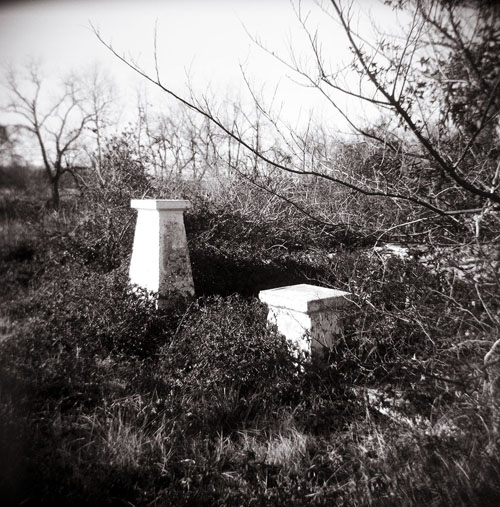
FAYETTEVILLE, Ark. – A photograph by Phoebe McCormick Lickwar was one of 90 selected from thousands of entries to be included in the Sixth Annual International Juried Plastic Camera Show. The show takes place March 6 through April 22 at RayKo Gallery in San Francisco, and an opening reception is planned for March 6.
Lickwar is an assistant professor of landscape architecture in the Fay Jones School of Architecture.
Her image, titled “Lost Farm, Cave Springs, Arkansas,” shows two pillars from a disappeared farmhouse, possibly from the late 1920s.
Since she arrived in Fayetteville more than a year ago, Lickwar has been researching agricultural sites that are no longer active – farms in various states of decay, with remnants of homes, chicken coops and barns. She’s investigating the transformation of agricultural landscapes over time.
As a landscape architect, photography provides her the chance to connect with the built environment in a “real and physical” way, as opposed to only research that is limited to records and data.
“It’s a way for me to interface with landscape and the built environment one on one,” she said. “I don’t want to lose that connection. I think it’s important to be on the ground and to have an intimate connection with the places I’m studying.”
The camera she used to capture the image of the old farmhouse is a black Holga – a model of camera designed by T.M. Lee in 1981 in China. It has a plastic body and plastic lens and uses medium-format film; she typically shoots in black and white.
The camera, which she’s used for 18 years, is about as low-tech as it gets, with no controls for adjusting light exposure or focal length. “You have to know what kind of light you’re shooting in,” she said. “And you have to shoot in the right kind of light so enough will register on the film so you can make a print.”
Lickwar actually relishes the restrictions of this method of photography, which emphasizes the photographer’s experience with the subject.
“You’re not permitted to think about technical aspects of the camera – so you just purely think about the subject matter, what you’re photographing and what you’re seeing,” she said. “It’s a direct tool to get at the heart of what I’m trying to communicate or what I’m trying to discover with the camera.”
In many places that are being developed, the sites are built on more quickly, and the old and aging pieces of the landscape are erased and replaced. In those places, observers aren’t given the chance to watch the decay.
Lickwar found the Cave Springs site while driving around the countryside looking for old barns. The landscape had crept in, and all that remained of a former farmhouse were two pillars and a foundation. It’s a relic in a region that’s losing a part of its history, as the ties with subsistence farming fade.
“It’s just amazing to me that those structures are out there, and they’re a visual of the transformation that occurs over time,” she said. “It’s a visible reminder of what’s taking place in our landscape.”
Contacts
Michelle Parks, director of communications
Fay Jones School of Architecture
479-575-4704, mparks17@uark.edu